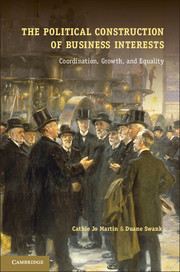Book contents
- Frontmatter
- Contents
- Figures
- Tables
- Acknowledgments
- Introduction
- 1 Collective Political Engagement and the Welfare State
- 2 The Political Origins of Coordinated Capitalism
- 3 Party Conflict and the Origins of Danish Labor Market Coordination
- 4 British Experiments in National Employers’ Organization
- 5 Sectional Parties and Divided Business in the United States
- 6 The Origins of Sector Coordination in Germany
- 7 Twenty-First Century Breakdown? Challenges to Coordination in the Postindustrial Age
- 8 Institutional Sources of Employers’ Preferences for Social Policy
- 9 Employers, Coordination, and Active Labor Market Policy in Postindustrial Denmark
- 10 Employers and Active Labor Market Policy in Postindustrial Britain
- 11 The Failure of Coordination and the Rise of Dualism in Germany
- 12 The Political Foundations of Redistribution and Equality
- Conclusion Social Solidarity after the Crisis of Finance Capitalism
- Bibliography
- Index
Conclusion - Social Solidarity after the Crisis of Finance Capitalism
Published online by Cambridge University Press: 05 June 2012
- Frontmatter
- Contents
- Figures
- Tables
- Acknowledgments
- Introduction
- 1 Collective Political Engagement and the Welfare State
- 2 The Political Origins of Coordinated Capitalism
- 3 Party Conflict and the Origins of Danish Labor Market Coordination
- 4 British Experiments in National Employers’ Organization
- 5 Sectional Parties and Divided Business in the United States
- 6 The Origins of Sector Coordination in Germany
- 7 Twenty-First Century Breakdown? Challenges to Coordination in the Postindustrial Age
- 8 Institutional Sources of Employers’ Preferences for Social Policy
- 9 Employers, Coordination, and Active Labor Market Policy in Postindustrial Denmark
- 10 Employers and Active Labor Market Policy in Postindustrial Britain
- 11 The Failure of Coordination and the Rise of Dualism in Germany
- 12 The Political Foundations of Redistribution and Equality
- Conclusion Social Solidarity after the Crisis of Finance Capitalism
- Bibliography
- Index
Summary
Introduction
Bringing to mind the old Chinese curse, we have the dubious privilege of living in interesting times. The global financial crisis of 2008 set off a new attack on economic truisms and political leadership, thrust advanced industrial nations into a new period of soul searching and suggested that economic well-being may well be doomed by the fits and starts associated with outrageous fortunes. Public opinion seems insecure, both condemning the folly of unregulated markets yet questioning the wisdom of governmental oversight. At this dark and terrible moment, one wants a lantern to guide us through the chaos.
This final chapter reflects on how the global economic crisis might affect governments’ capabilities for sustaining the social democratic model and abilities to draw employers into coalitions in support of social investments. Earlier chapters explore two transitional moments in industrial relations, the rise of advanced industrial capitalism and the advent of the postindustrial economy. We show that some governments’ efforts to create and to sustain institutions for coordination among the social partners had a major impact on the evolution and survival of programs to enhance skills and to reduce long-term unemployment. But the financial crisis may well ushere in a new era of economic constraint: Major service sectors (in particular finance and real estate) have faltered badly and globalization seems in remission. Thus, one wonders if the institutional structures that sustained economic and social coordination against globalization, deindustrialization, and neoliberalism continue to have the same impact in the new economic climate. Will the havens of security gain the upper hand or does the old logic break down? Crises of capitalism can lead to new openings: new forms of policy regimes, new institutions and new relations among nations; and with this in mind, we speculate about the possible outcomes in a new world order.
- Type
- Chapter
- Information
- The Political Construction of Business InterestsCoordination, Growth, and Equality, pp. 248 - 256Publisher: Cambridge University PressPrint publication year: 2012

